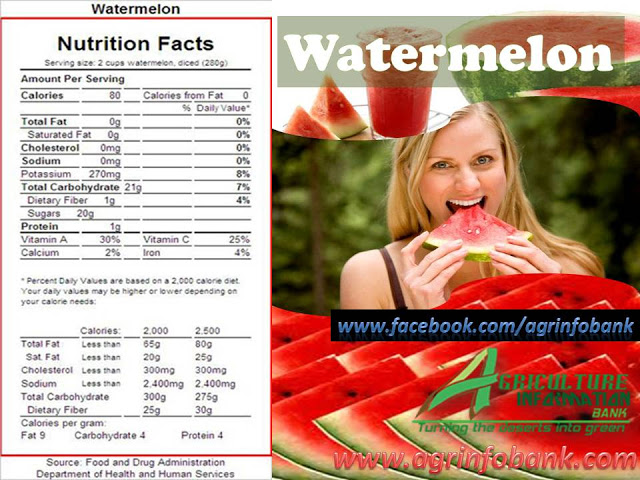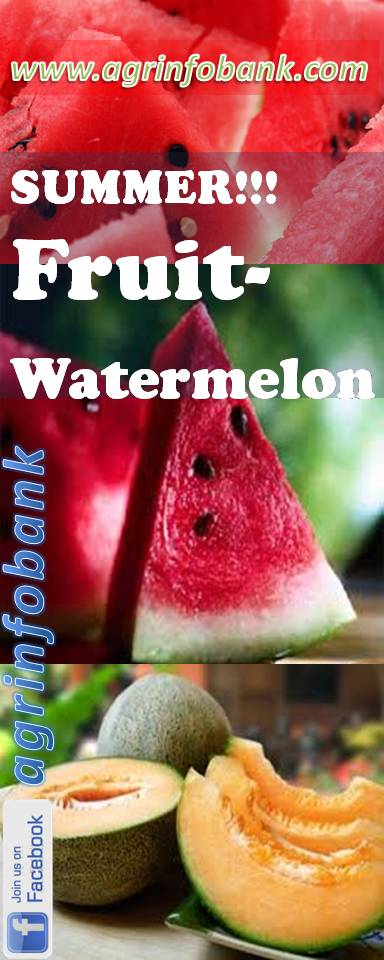Agriculture

 Melons are part of the gourd family that includes cucumbers and squashes with the difference that melons are consumed as fruits due to their much sweeter and juicy flavor. There are different types of Melons like:
Melons are part of the gourd family that includes cucumbers and squashes with the difference that melons are consumed as fruits due to their much sweeter and juicy flavor. There are different types of Melons like:
- Cucumber Nutrition Facts
BY: A M Awan Ever wonder how to beat the scorching summer heat? Remember humble crunchy cucumber! This wonderful, low calorie vegetable indeed has more nutrients to offer than just water and electrolytes. The vegetable is one of the oldest cultivated...
- Apple Fruit Nutrition Facts
By: A. M. Awan Delicious and crunchy apple fruit is one of the most popular fruits, favorite of health conscious, fitness lovers who believe in the concept ?health is wealth.? This wonderful fruit is packed with rich phyto-nutrients that in the true senses...
- Green Chilli
Chili pepper (chilli pepper, chilli, chili, chile) is the fruit of the plants from the genus Capsicum, members of the nightshade family, Solanaceae. Botany considers the plant a berry bush. Though chilis may be...
- An Apple A Day Keeps The Doctor Away
Apple - Nutritional & Medicinal benifits Eating 2 apples a day, their cholesterol levels by at least 10% are people who are suffering from gout and arthritis, will be for. Regularly eat apples, because it will aid. An apple juice, 3 times a day...
- Banana - Importance & Uses
There are various important uses which proves banana a vital food source in our regular diet .Out of it major uses of banana are divided into two types. they are as follows : Nutritional values Because their impressive potassium content, bananas high...
Agriculture
SUMMER!!! Fruit-Watermelon
Some foods are fun to eat, and watermelon is definitely one of them. That triangular wedge of bright red/white/green, sweet juiciness forbids us to take life too seriously and shouts, ?SUMMER!!!? As if that weren?t enough, watermelon is packed full of nutrition, hydrates and is low-fat. While many of us think of watermelon as a great snack option, when you tally up its nutritive value, you might consider making this all-star a feature player in your cuisine.

Interesting Facts
Melon fruit contains a lot of water (about 95% of the fruit) also rich in vitamins and minerals, so it has many benefits for our health. From the side of water content, melons can give sense of cool and soothing effect, so it can relieve heartburn and cleanse the kidneys from the remnants of metabolism. Melons are low in calories, with just 64 calories in a 1-cup serving of honeydew balls and fewer calories in cantaloupe, casaba or watermelon balls. At the same time, melons are high in essential vitamins and minerals. They contain almost no fat or saturated fat, making them an excellent choice for snacks or a side dish.
Watermelons are an excellent source of several vitamins: vitamin A, which helps maintain eye health and is an antioxidant; vitamin C, which helps strengthen immunity, heal wounds, prevent cell damage, promote healthy teeth and gums; and vitamin B6, which helps brain function and helps convert protein to energy.
Tomatoes have been highly touted as a great source for lycopene, a powerful antioxidant that helps fight heart disease and several types of cancer ? prostate cancer in particular. Watermelon, however, has the highest concentrations of lycopene of any fresh fruit or vegetable.
If your little ones don?t dig into their swiss chard, lima beans or spinach ? all great sources of potassium ? consider offering them a serving of watermelon instead. It is a great source of potassium, which helps muscle and nerve function, helps maintain the body?s proper electrolyte and acid-base balance, and helps lower the risk of high blood pressure.
Watermelon also contains the amino acids citrulline and arginine, which can help maintain arteries, blood flow and overall cardiovascular function.
Alone or in a fruit salad are the most common ways many of us eat watermelon. While eating the meat of the fruit is the best way to take advantage of all of its nutrients, this is one of my favorite bits of summer refreshment. I get a version of this from my local burrito truck. The key to making this great: don?t oversweeten it. With just a touch of sweetness, it?s heavenly.
Benefits of melon fruit itself has been tested to treat various types of diseases ranging from mild to chronic diseases. Melons are low in calories, with just 64 calories in a 1-cup serving of honeydew balls and fewer calories in cantaloupe, casaba or watermelon balls. At the same time, melons are high in essential vitamins and minerals. They contain almost no fat or saturated fat, making them an excellent choice for snacks or a side dish.
Melon Nutritional Values is 15.00 mg calcium; 25.00 mg phosphorus, 0.5 mg iron, 34 mg of Vitamin C; 640 mg IU Vitamin A, and 0.03 mg of Vitamin B1. Melon contains an anticoagulant called adenosine so it can stop the clotting of blood cells that can lead to stroke or heart diseases.
 Melons are part of the gourd family that includes cucumbers and squashes with the difference that melons are consumed as fruits due to their much sweeter and juicy flavor. There are different types of Melons like:
Melons are part of the gourd family that includes cucumbers and squashes with the difference that melons are consumed as fruits due to their much sweeter and juicy flavor. There are different types of Melons like:- Watermelon (Tarbooz)
- Cantaloupe (Kharbooza)
- Honeydew Melon etc
Melon Health Benefits
1. Cancer Prevention
Melon fruit contains high carotenoid that this fruit can prevent cancer and reduce the risk of lung cancer. Melon fruit can prevent and kill cancer seeds that will invade our bodies. So try to eat melons, to avoid cancer.
2. Stroke and heart disease Prevention
Melon contains an anticoagulant called adenosine to stop clotting of blood cells which can lead to stroke or heart diseases. So the melons will help smooth the blood in the body so that a small risk of stroke or heart diseases incidence.
3. Good for digestion
Melons can launch a bowel movement, when we are experiencing digestive problems then eat melon to be easy and smooth bowel movement. Water content in the melon is very good for digestion. Mineral content is able to eliminate the acidity of the body need to be eliminated because it can interfere with digestion, particularly in the stomach organ.
4. Maintaining healthy skin
Melon contains collagen, the protein compounds that affect the integrity of the cell structure in all connective tissues such as skin. Collagen also serve For accelerates wound healing and maintain skin firmness. If you often eat melon means the skin will not be rough and dry.
5. Helps heal kidney disease and eczema.
Melon has a very good diuretic power so that it can help cure kidney disease and severe diseases and acute eczema. If combined with lemon, then a melon can cure gout. So a good idea to consume melons regularly once a day in the morning.
6. Boost of Energy
Most melons are contain B vitamins. B vitamins are responsible for a lot of your body's energy production (they are necessary for the body to process sugars and carbs). Hence, eating melons can give you substantial energy
7. For weight loss
Melons are ideal food for people who want to lose weight because they are low in sodium, fat-free, cholesterol free and low in calories (a whole cup of watermelon contains only 48 calories). They will also make you feel fuller because of the high water content. The natural sweetness found in melons will help you not to be tempted to grab those high calorie sweets.
Reference:
1. USDA Nutrient Data Laboratory: Melons, honeydew, raw
2. http://www.care2.com
3. http://letsgohealthy.blogspot.com
- Cucumber Nutrition Facts
BY: A M Awan Ever wonder how to beat the scorching summer heat? Remember humble crunchy cucumber! This wonderful, low calorie vegetable indeed has more nutrients to offer than just water and electrolytes. The vegetable is one of the oldest cultivated...
- Apple Fruit Nutrition Facts
By: A. M. Awan Delicious and crunchy apple fruit is one of the most popular fruits, favorite of health conscious, fitness lovers who believe in the concept ?health is wealth.? This wonderful fruit is packed with rich phyto-nutrients that in the true senses...
- Green Chilli
Chili pepper (chilli pepper, chilli, chili, chile) is the fruit of the plants from the genus Capsicum, members of the nightshade family, Solanaceae. Botany considers the plant a berry bush. Though chilis may be...
- An Apple A Day Keeps The Doctor Away
Apple - Nutritional & Medicinal benifits Eating 2 apples a day, their cholesterol levels by at least 10% are people who are suffering from gout and arthritis, will be for. Regularly eat apples, because it will aid. An apple juice, 3 times a day...
- Banana - Importance & Uses
There are various important uses which proves banana a vital food source in our regular diet .Out of it major uses of banana are divided into two types. they are as follows : Nutritional values Because their impressive potassium content, bananas high...
